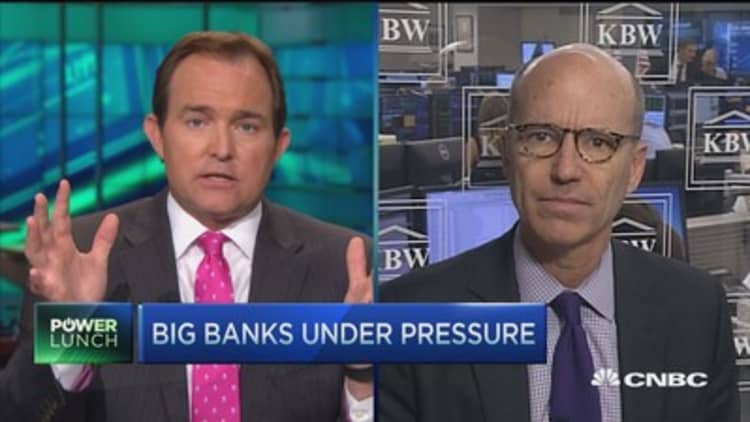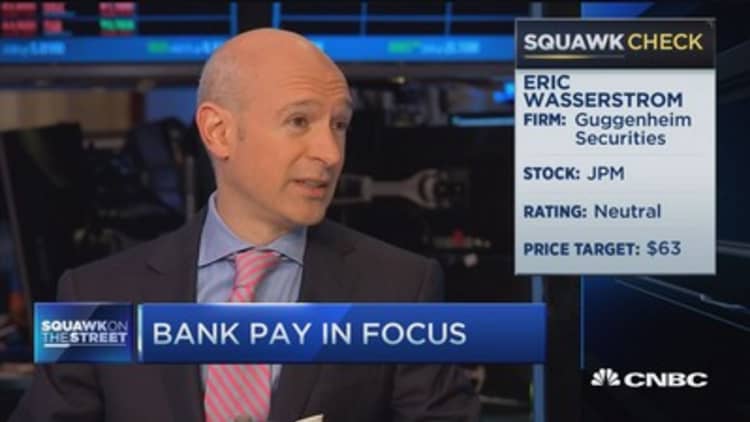


Like a dog with some really big fleas, the largest U.S. banks are likely to start shaking off some assets.
After decades of swallowing up their smaller competitors, regulatory and political pressure is putting warehouse financial institutions on the firing line to divest their businesses.
While too-big-to-fail banks have only gotten bigger since the financial crisis, analysts view that trend as about to change.
"We expect more divestiture to come from universal banks as higher capital requirements, the Volcker rule and higher liquidity requirements are fully phased in," Keefe, Bruyette & Woods said in a report for clients. "We believe this trend will create opportunities for small and midsized firms in the U.S. and abroad."
Five of the nation's biggest banks control a record 45 percent of the industry's total assets while the eight so-called universal banks hold about 60 percent of the total, according to KBW and SNL Financial.
Read MoreProof! CEOs hurt companies by golfing too much
However, much of the growth has come in the form of cash on hand as regulations require more of a cushion for banks, particularly those with more than $50 billion in assets. Dodd-Frank rules as well as Basel III guidelines are redefining the way banks will operate in the future.
"Prior to the financial crisis, consolidation was a consistent profitable investment theme in financial stocks," KBW wrote. "Since then, and with the labeling of the country's largest banks as globally systemic, the reverse has been true: the fragmentation of the largest financial firms is creating arguably the best opportunities in the sector."
Indeed, despite a growing cash pile banks have been shedding assets over the past five years:
Addition and subtraction since 2010
| Bank | Assets ($billions) | Acquisitions | Divestitures | Difference |
|---|---|---|---|---|
| JPMorgan Chase | 2,577 | 16 | 28 | -12 |
| Bank of America | 2,144 | 7 | 72 | -65 |
| Citigroup | 1,832 | 9 | 71 | -62 |
| Wells Fargo | 1,738 | 29 | 11 | 18 |
| Goldman Sachs | 865 | 22 | 17 | 5 |
| Morgan Stanley | 829 | 5 | 22 | -17 |
| Bank of New York Mellon | 399 | 9 | 5 | 4 |
| State Street | 279 | 7 | 2 | 5 |
| Total | 104 | 228 | 124 |
Source: Source: SNL Financial/KBW Research
Two examples KBW cited of moves that will become a longer-term pattern: Royal Bank of Scotland in March shedding $3.2 billion of its stake in Citizens Financial Group; and General Electric announcing in April that it would be dumping $200 billion of financial assets.
Big banks already have been shuttering branches, cutting them in record numbers in 2014 as part of a continuing pattern.
Bank earnings have remained strong, with financials broadly gaining 18.3 percent in the first quarter. About 54 percent of banks beat estimates, with profits flat quarter over quarter and up 13 percent annualized.
Stocks have done well, also.
S&P 500 banks have gained 1.8 percent year to date, which actually is underperforming the broader index. But they've been on fire lately. Banks in the index have gained 5.4 percent over the past month and 6.2 percent in the past three months. JPMorgan Chase, for one, was trading near all-time highs Tuesday.
KBW, though, believes investors should look to the future, which will include smaller big banks and a more fragmented industry.
Here's a list of the stocks KBW analysts see as benefiting from big banks selling off parts of their operations:






